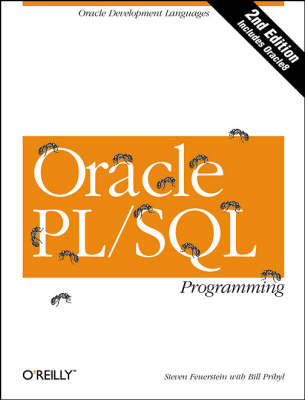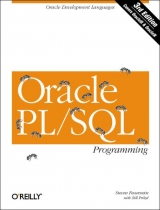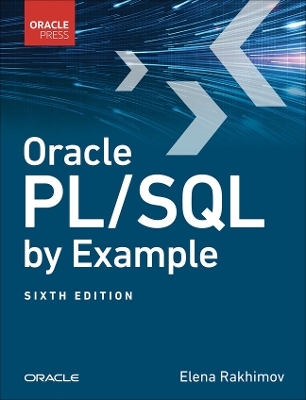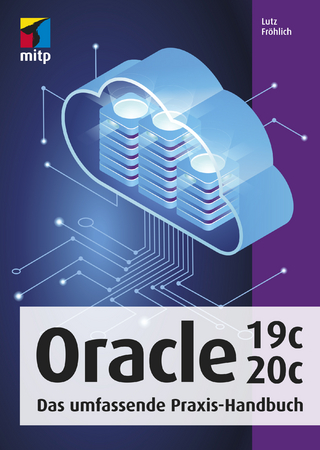
Oracle PL/SQL Programming
O'Reilly Media, Inc, USA (Verlag)
978-1-56592-335-5 (ISBN)
- Titel ist leider vergriffen;
keine Neuauflage - Artikel merken
This new edition of "Oracle PL/SQL Programming" updates Oracle8 material and includes chapters on Oracle8 object types, object views, collections, and external procedures. It also covers new datatypes and functions, and contains new chapters on tuning, tracing, and debugging PL/SQL programs. The companion diskette contains an online Windows-based tool offering access to more than 100 files of source code and documentation prepared by the authors.
Steven Feuerstein is considered one of the world's leading experts on the Oracle PL/SQL language. He is also the author of the sequel to Oracle PL/SQL Programming, Advanced Oracle PL/SQL Programming with Packages (O'Reilly & Associates, 1996), and the upcoming Oracle Built-in Packages (O'Reilly & Associates, 1998). Steven has been developing software since 1980 and worked for Oracle Corporation from 1987 to 1992. He is a partner with RevealNet, Inc. (www.revealnet.com) and is the chief architect of the RevealNet products, PL/SQL Knowledge Base and PL/Vision (a code library of prebuilt PL/SQL packages that accelerates PL/SQL-based application development). Steven also sysops RevealNet's "PL/SQL Pipeline," an online community for PL/SQL developers (www.revealnet.com/plsql-pipeline). He can be reached through email at feuerstein@revealnet.com. Steven is also president of PL/Solutions, which offers training and consulting on both PL/Vision and PL/SQL (www.plsolutions.com). Finally (on the Oracle side of Steven's life), he serves as codirector of the Oracle Practice at SSC, a systems management consulting firm based in Chicago (www.saraswati.com). Steven shares his Rogers Park, Chicago, Georgian with his wife Veva, his youngest son Eli, two cats (Sister Itsacat and Moshe Jacobawitz), and Mercury (the Congo Red African Gray parrot). His older son, Chris, is busy making music and creating art nearby. Steven is a member of the Board of Directors of the Crossroads Fund, which provides grants to organizations in Chicago working for social change. Bill Pribyl, founder and principal of DataCraft, Inc. (www.datacraft.com), has been learning and teaching about Oracle databases and applications for more than ten years. His work with object-oriented technology dates to the mid-1980s, when he coauthored a paper on the application of entity-relationship modeling to object-oriented analysis. A self-avowed Oracle "generalist," Bill has served as an Oracle database administrator for several billion-dollar companies; led the development of web-based database applications for online commerce; configured an ultra-high availability database using Oracle replication; helped NASA apply database technology to space shuttle simulation software; and developed and taught classes in PL/SQL, Developer/2000, and the Oracle database. An ardent supporter of the Oracle user community, Bill is past chair of the South Central (USA) Oracle Users Group. He also served as editor-in-chief of Select, the quarterly publication of the International Oracle Users Group-Americas. His work has been published in Oracle user group publications worldwide. He also authored JavaScript programming examples for The Official Netscape LiveWire Pro Book. Bill lives near his alma mater, Rice University, in Houston, Texas, with his wife Norma, son Johnny, stepson Geoffrey, four cats, and a deaf Dalmatian. He volunteer teaches a class on the Internet and beginning HTML to children in public middle school.
Foreword Preface I. Programming in PL/SQL 1. Introduction to PL/SQL What Is PL/SQL? The Concept of Programming in Oracle Applications The Origins of PL/SQL PL/SQL Versions Advice for Oracle Programmers A Few of My Favorite (PL/SQL) Things Best Practices for PL/SQL Excellence 2. PL/SQL Language Fundamentals The PL/SQL Character Set Identifiers Literals The Semicolon Delimiter Comments The PRAGMA Keyword Block Structure 3. Effective Coding Style Fundamentals of Effective Layout Formatting SQL Statements Formatting Control Structures Formatting PL/SQL Blocks Formatting Packages Using Comments Effectively Documenting the Entire Package II. PL/SQL Language Elements 4. Variables and Program Data Identifiers Scalar Datatypes NULLs in PL/SQL Variable Declarations Anchored Declarations Programmer-Defined Subtypes Tips for Creating and Using Variables 5. Conditional and Sequential Control Conditional Control Statements Sequential Control Statements 6. Database Interaction and Cursors Transaction Management Cursors in PL/SQL Implicit and Explicit Cursors Declaring Cursors Opening Cursors Fetching from Cursors Column Aliases in Cursors Closing Cursors Cursor Attributes Cursor Parameters SELECT FOR UPDATE in Cursors Cursor Variables Working with Cursors 7. Loops Loop Basics The Simple Loop The Numeric FOR Loop The Cursor FOR Loop The WHILE Loop Managing Loop Execution Tips for PL/SQL Loops 8. Exception Handlers Why Exception Handling? The Exception Section Types of Exceptions Determining Exception-Handling Behavior Raising an Exception Handling Exceptions Client-Server Error Communication NO_DATA_FOUND: Multipurpose Exception Exception Handler as IF Statement RAISE Nothing but Exceptions 9. Records in PL/SQL Record Basics Table-Based Records Cursor-Based Records Programmer-Defined Records Assigning Values to and from Records Record Types and Record Compatibility Nested Records 10. PL/SQL Tables PL/SQL Tables and Other Collections Characteristics of PL/SQL Tables PL/SQL Tables and DML Statements Declaring a PL/SQL Table Referencing and Modifying PL/SQL Table Rows Filling the Rows of a PL/SQL Table Clearing the PL/SQL Table PL/SQL Table Enhancements in PL/SQL Release 2.3 Working with PL/SQL Tables III. Built-In Functions 11. Character Functions Character Function Descriptions Character Function Examples 12. Date Functions Date Function Descriptions Date Function Examples 13. Numeric, LOB, and Miscellaneous Functions Numeric Function Descriptions LOB Function Descriptions Miscellaneous Function Descriptions 14. Conversion Functions Conversion Formats Conversion Function Descriptions Conversion Function Examples IV. Modular Code 15. Procedures and Functions Modular Code Review of PL/SQL Block Structure The Anonymous PL/SQL Block Procedures Functions Parameters Local Modules Module Overloading Forward Declarations Go Forth and Modularize! 16. Packages The Benefits of Packages Overview of Package Structure The Package Specification The Package Body Package Data Package Initialization 17. Calling PL/SQL Functions in SQL Looking at the Problem Syntax for Calling Stored Functions inSQL Requirements for Stored Functions inSQL Restrictions on PL/SQL Functions in SQL Calling Packaged Functions in SQL Column/Function Name Precedence Realities: Calling PL/SQL Functions in SQL Examples of Embedded PL/SQL V. New PL/SQL8 Features 18. Object Types Introduction to Oracle8 Objects Oracle Objects Example Syntax for Creating Object Types Manipulating Objects in PL/SQL and SQL Modifying Persistent Objects Object Housekeeping Making the Objects Option Work 19. Nested Tables and VARRAYs Types of Collections Creating the New Collections Syntax for Declaring Collection Datatypes Using Collections Collection Pseudo-Functions Collection Built-Ins Example: PL/SQL-to-Server Integration Collections Housekeeping Which Collection Type Should I Use? 20. Object Views Example: Using Object Views INSTEAD OF Triggers Syntax for Object Views Differences Between Object Views and Object Tables Not All Views with Objects Are Object Views Schema Evolution Object Views Housekeeping Postscript: Using the BFILE Datatype 21. External Procedures Introduction to External Procedures Steps in Creating an External Procedure Syntax for External Procedures Mapping Parameters OCI Service Routines External Procedure Housekeeping Examples VI. Making PL/SQL Programs Work 22. Code Design Tips Select Meaningful Module and Parameter Names Build the Most Functional Functions Take Full Advantage of Local Modularization Be Wary of Modules Without Any Parameters Create Independent Modules Construct Abstract Data Types (ADTs) Tips for Parameter Design 23. Managing Code in the Database Executing Stored Code Transaction Integrity and Execute Authority Module Validation and Dependency Management Remote Procedure Calls Managing Stored Objects with SQL*Plus Using SQL to Examine Stored Objects Encrypting Stored Code 24. Debugging PL/SQL The Wrong Way to Debug Debugging Tips and Strategies 25. Tuning PL/SQL Applications Analyzing Program Performance Tuning Access to Compiled Code Tuning Access to Your Data Tuning Your Algorithms Overview of PL/SQL8 Enhancements 26. Tracing PL/SQL Execution The PL/SQL Trace Facility Tracing for Production Support Free Format Filtering Structured Interface Filtering Quick-and-Dirty Tracing VII. Appendixes A. What's on the Companion Disk? B. Calling Stored Procedures from PL/SQL Version 1.1 C. Built-In Packages Index
| Erscheint lt. Verlag | 7.10.1997 |
|---|---|
| Zusatzinfo | illustrations |
| Verlagsort | Sebastopol |
| Sprache | englisch |
| Maße | 178 x 232 mm |
| Gewicht | 1450 g |
| Einbandart | kartoniert |
| Themenwelt | Informatik ► Datenbanken ► Oracle |
| Mathematik / Informatik ► Informatik ► Software Entwicklung | |
| ISBN-10 | 1-56592-335-9 / 1565923359 |
| ISBN-13 | 978-1-56592-335-5 / 9781565923355 |
| Zustand | Neuware |
| Haben Sie eine Frage zum Produkt? |
aus dem Bereich



